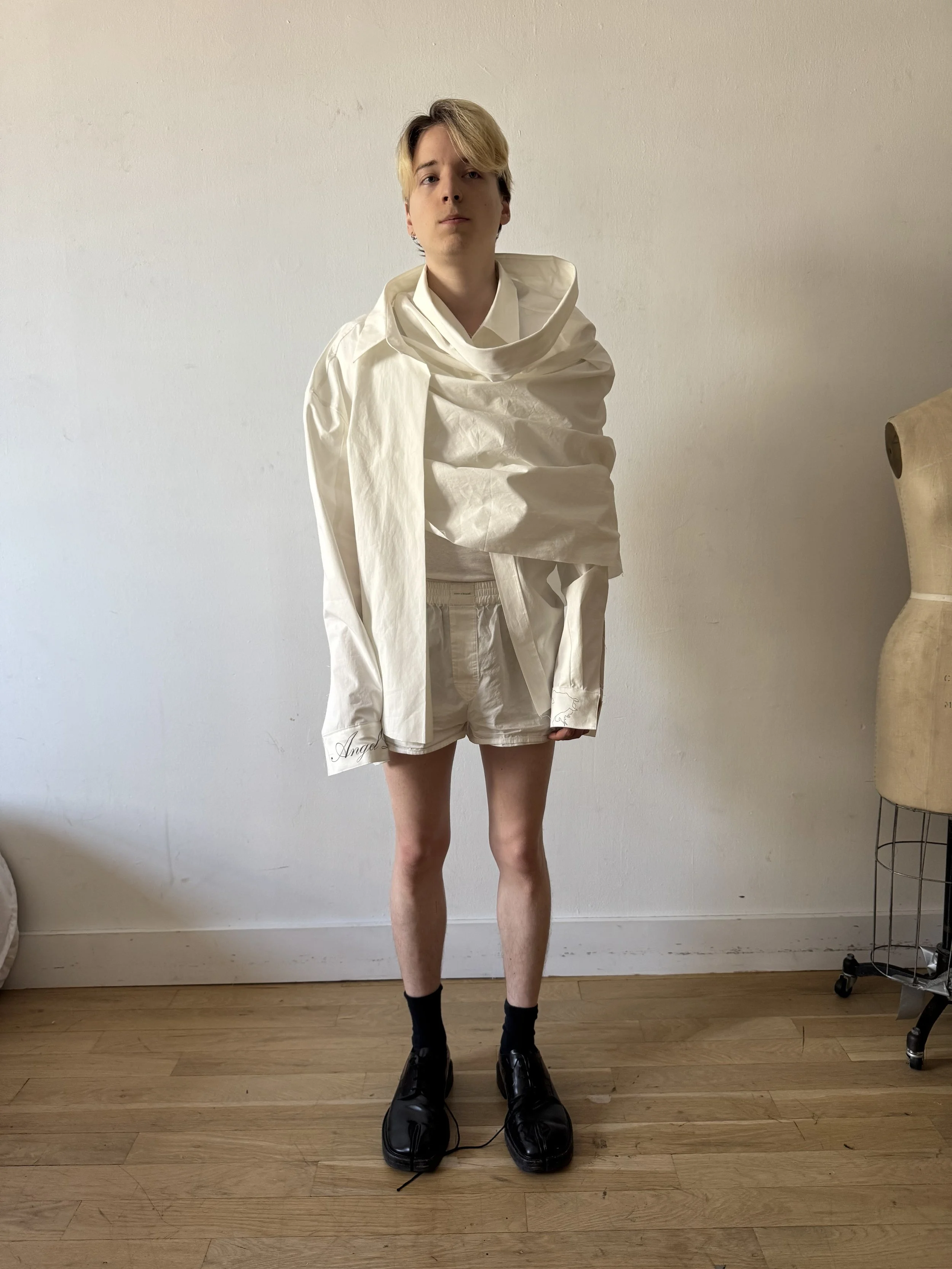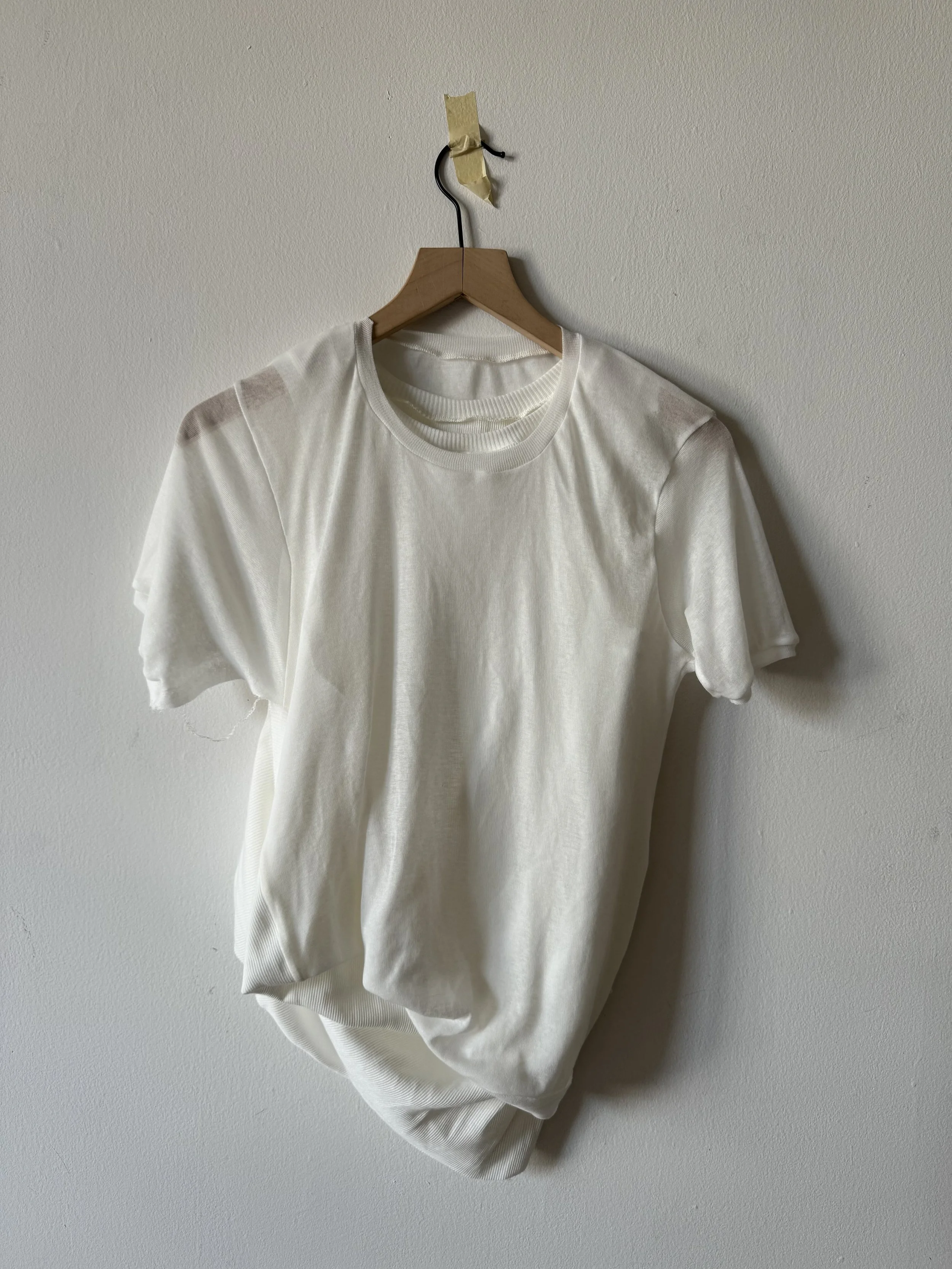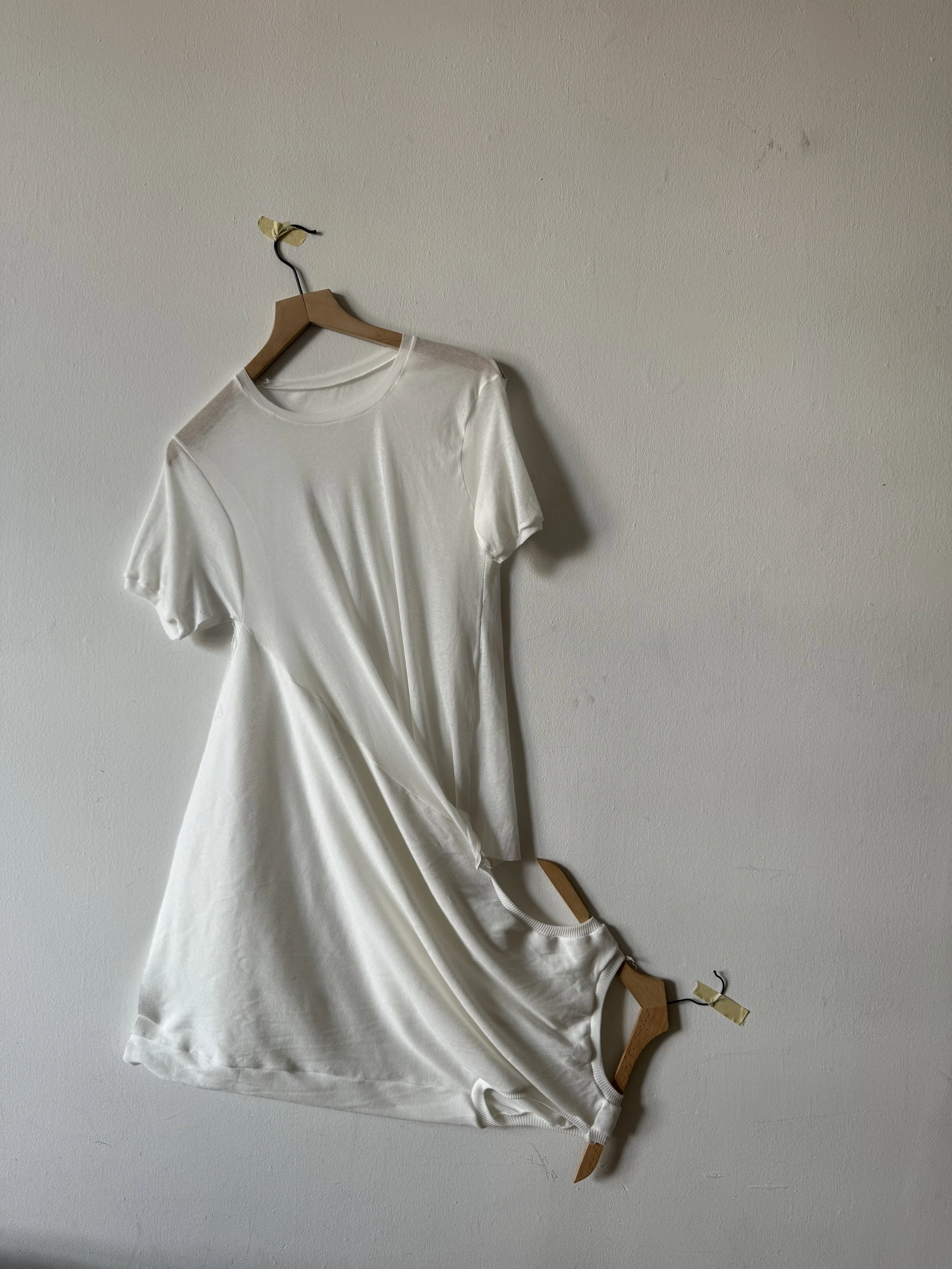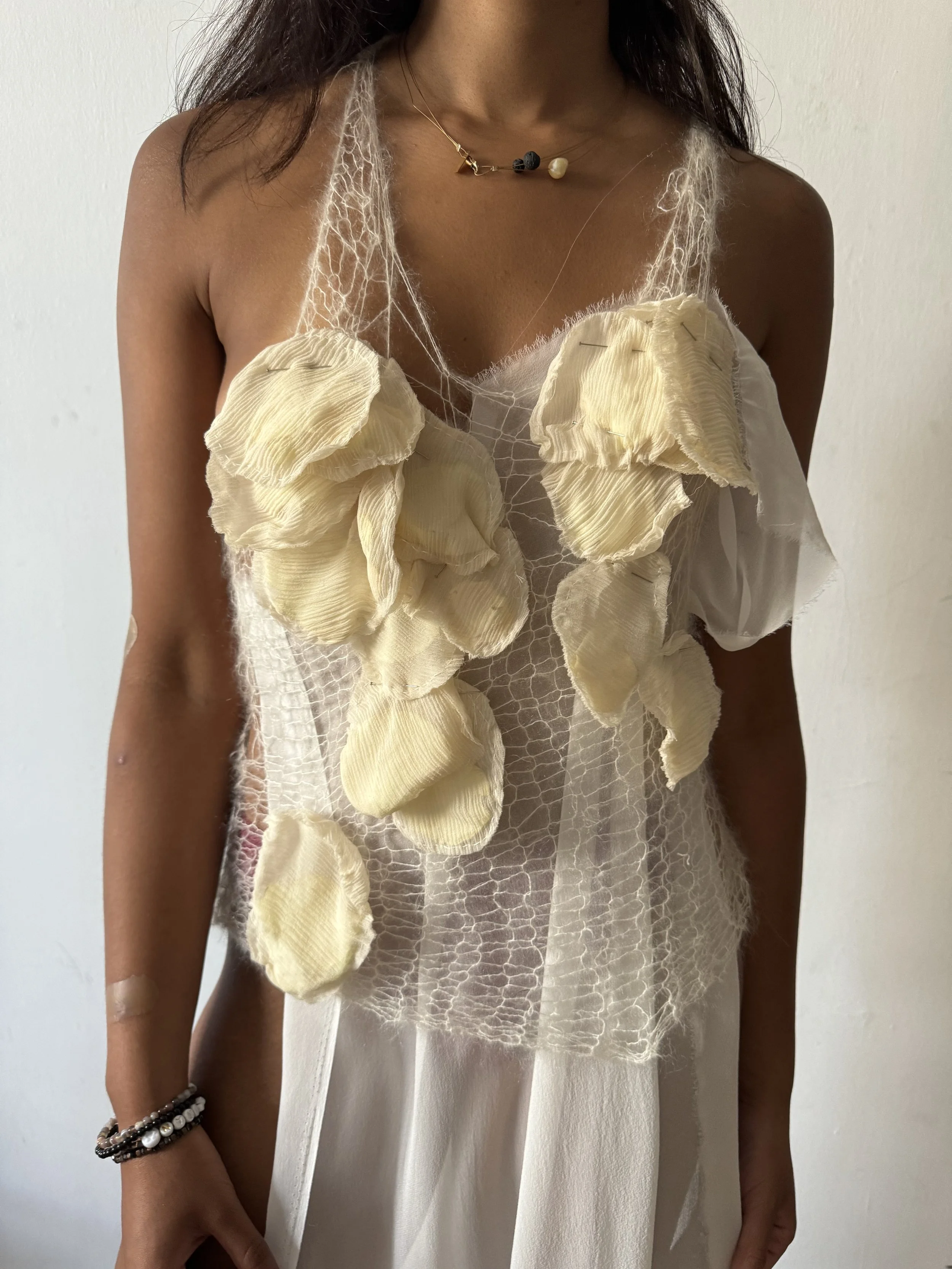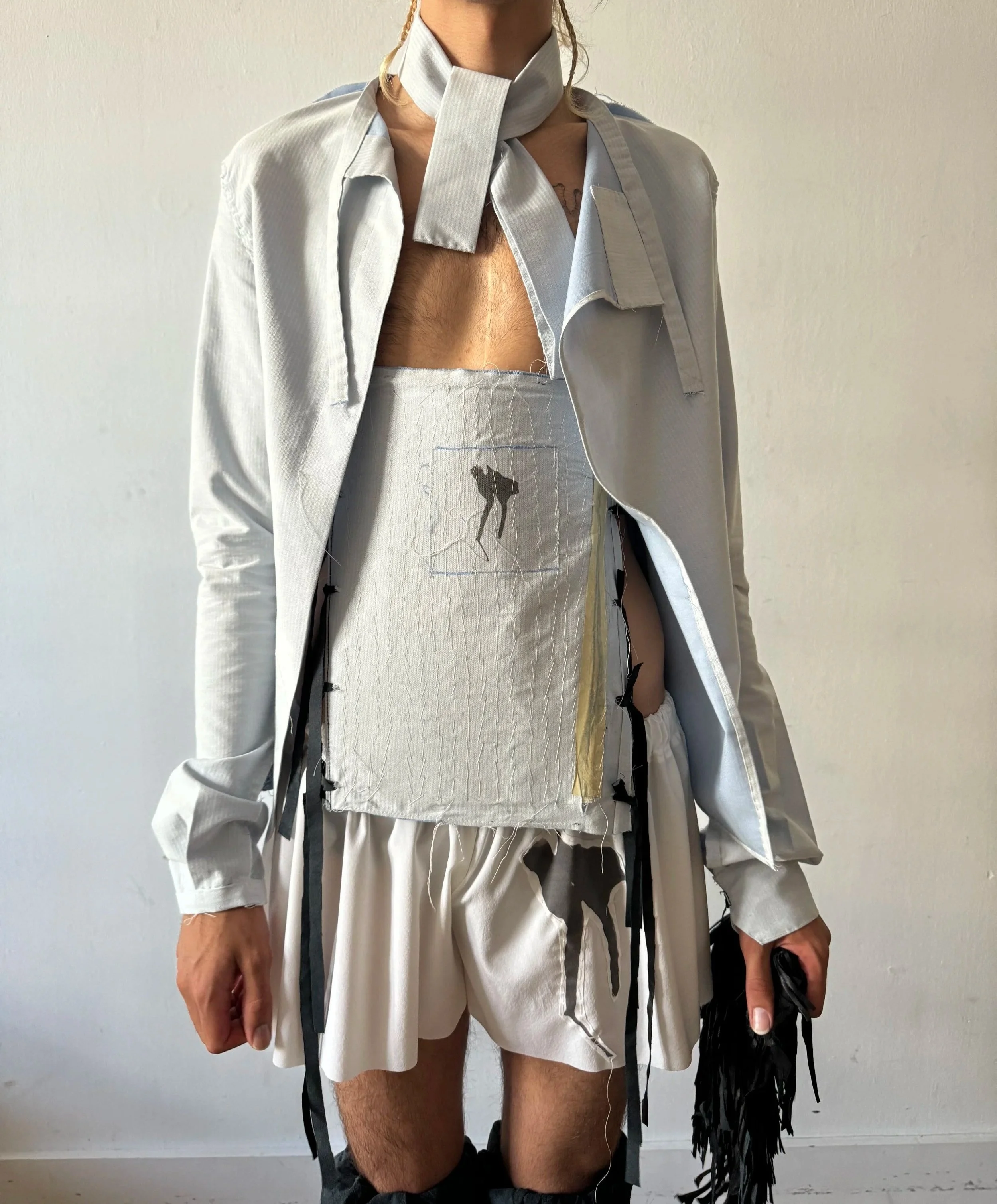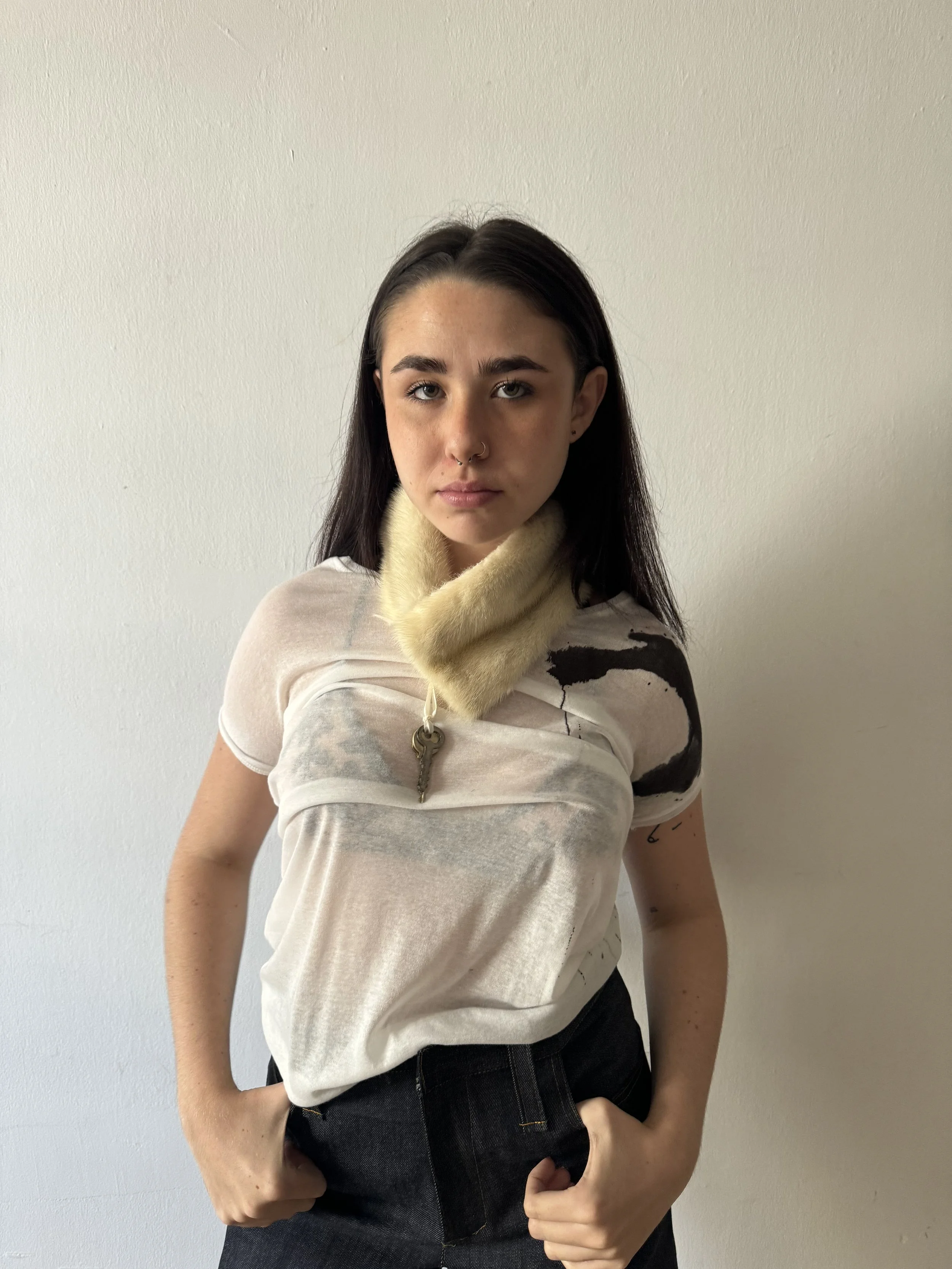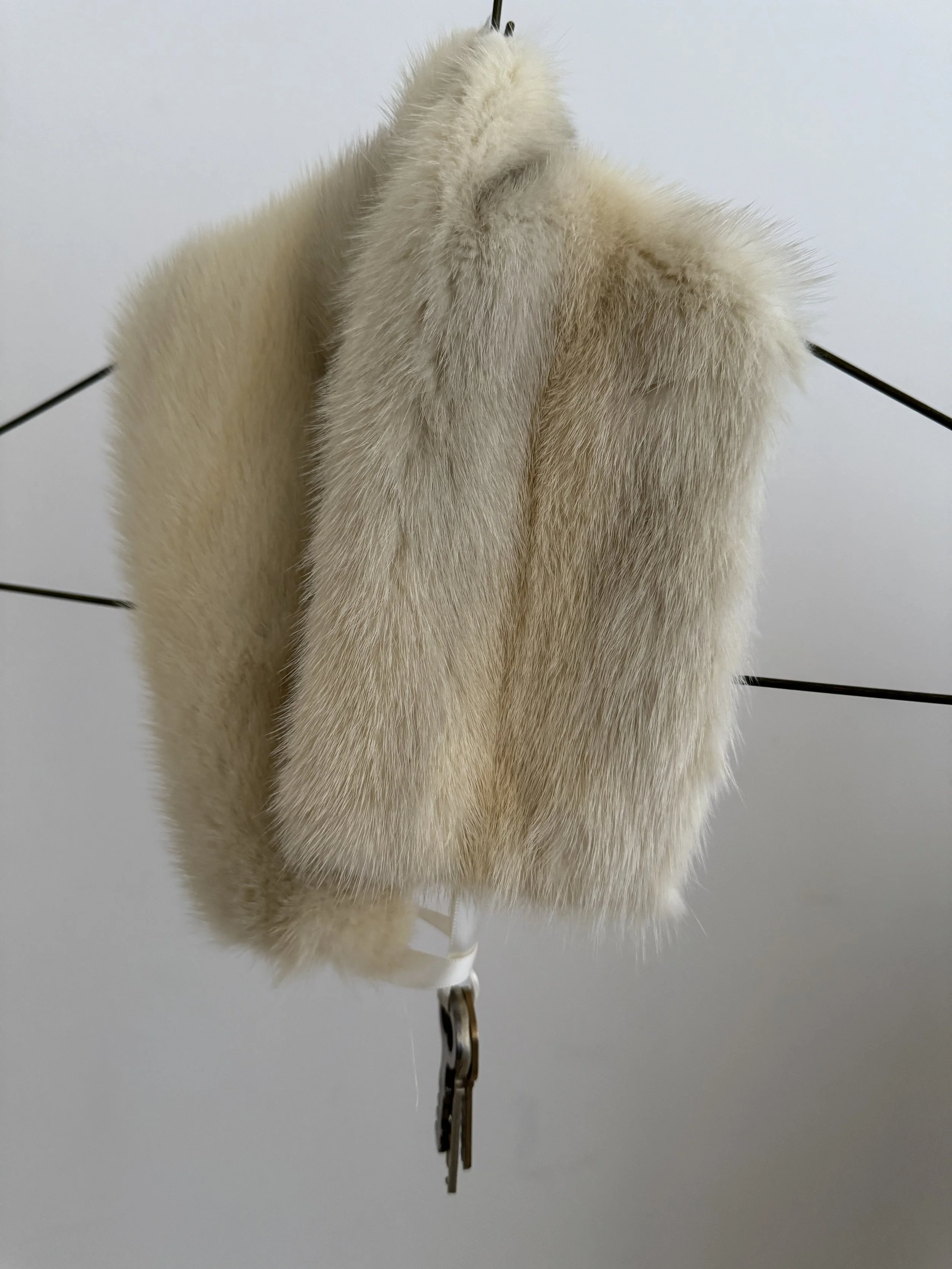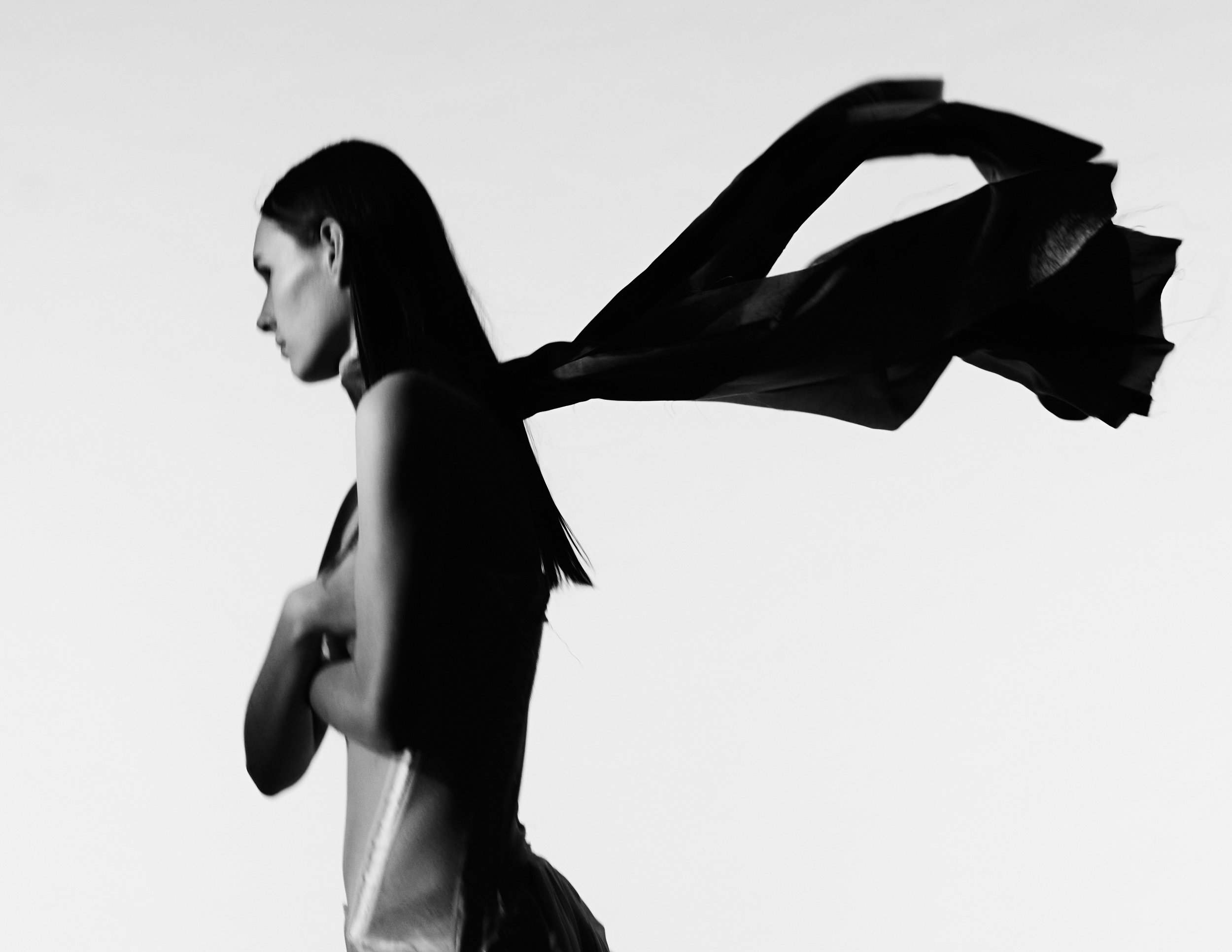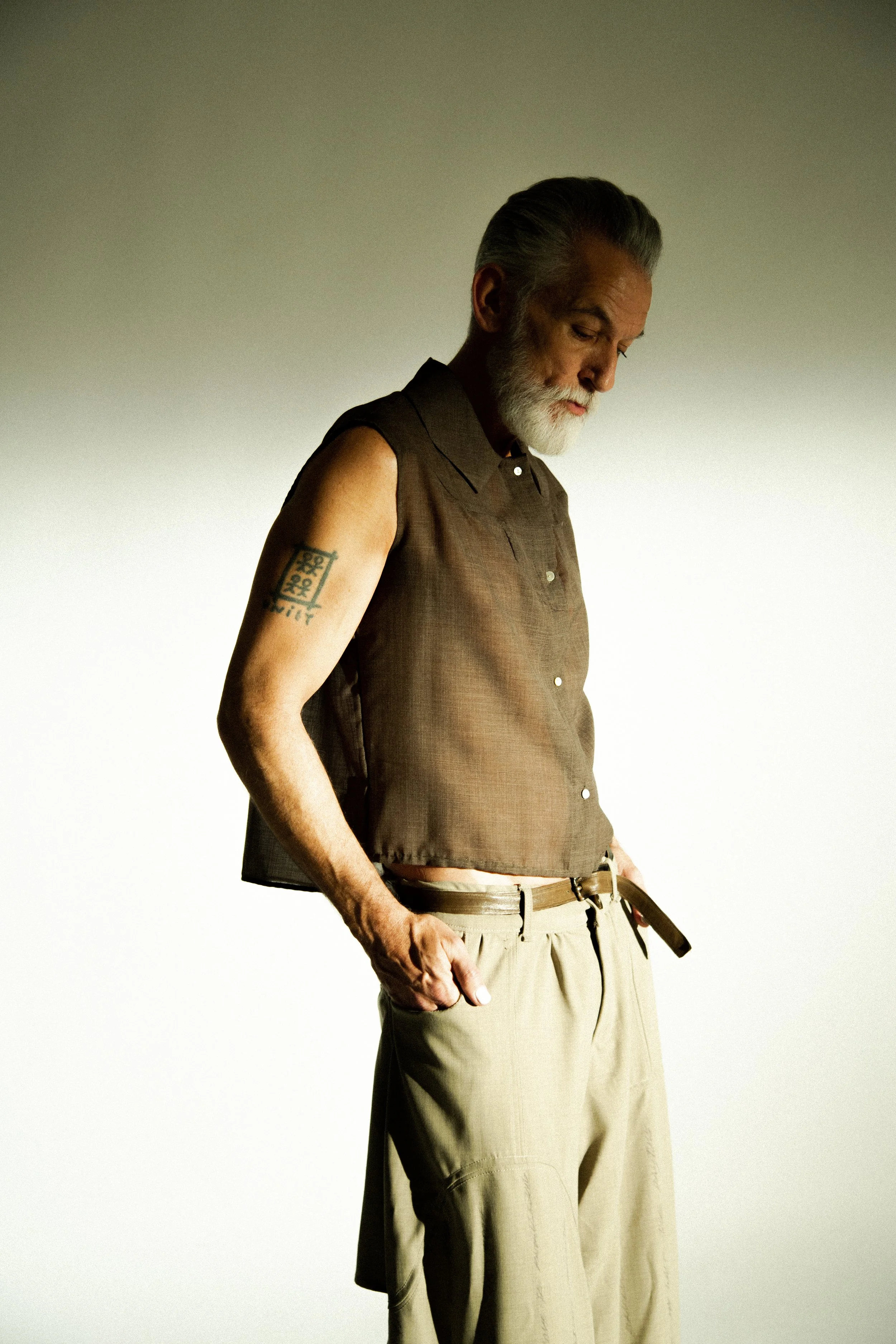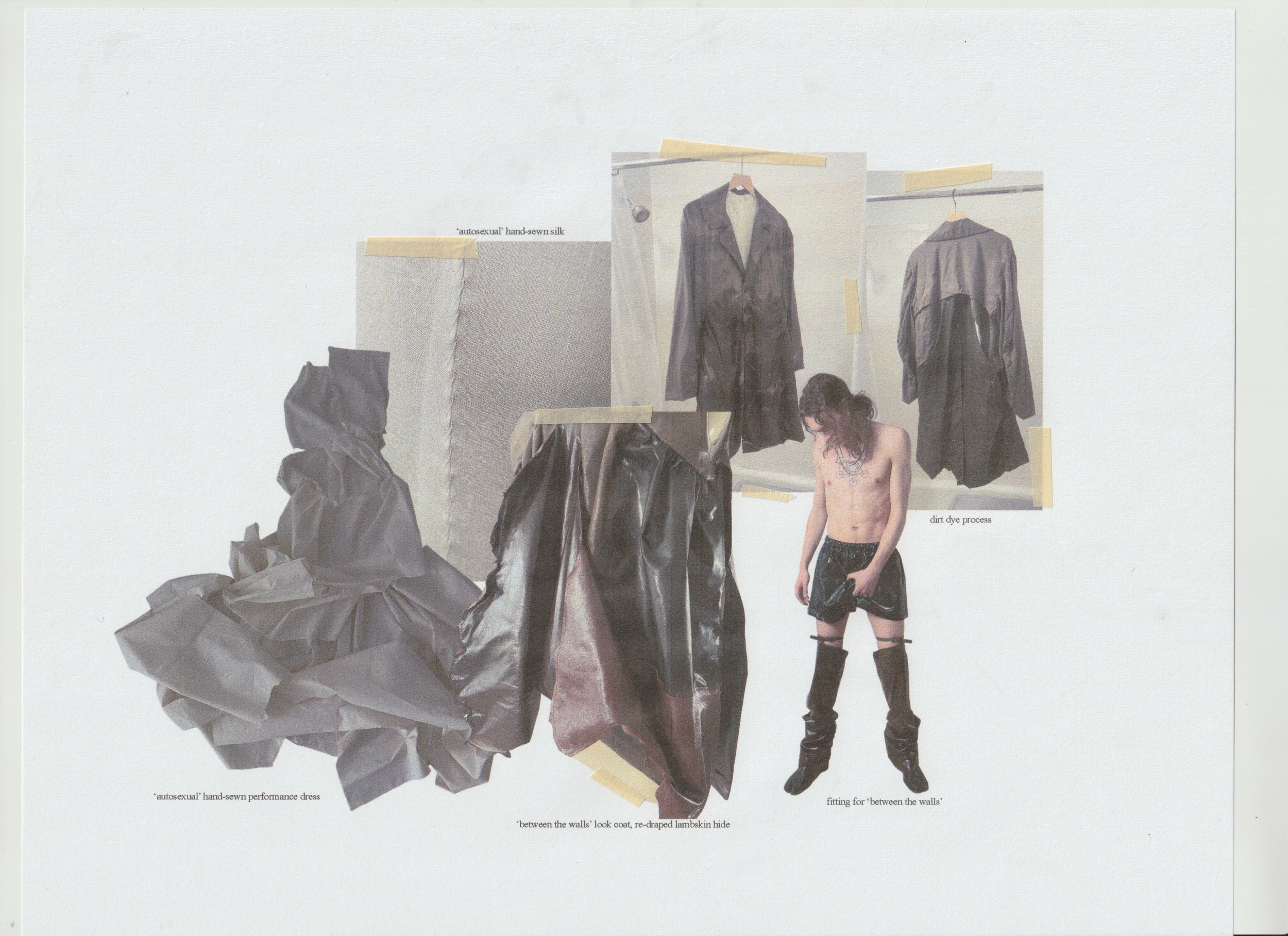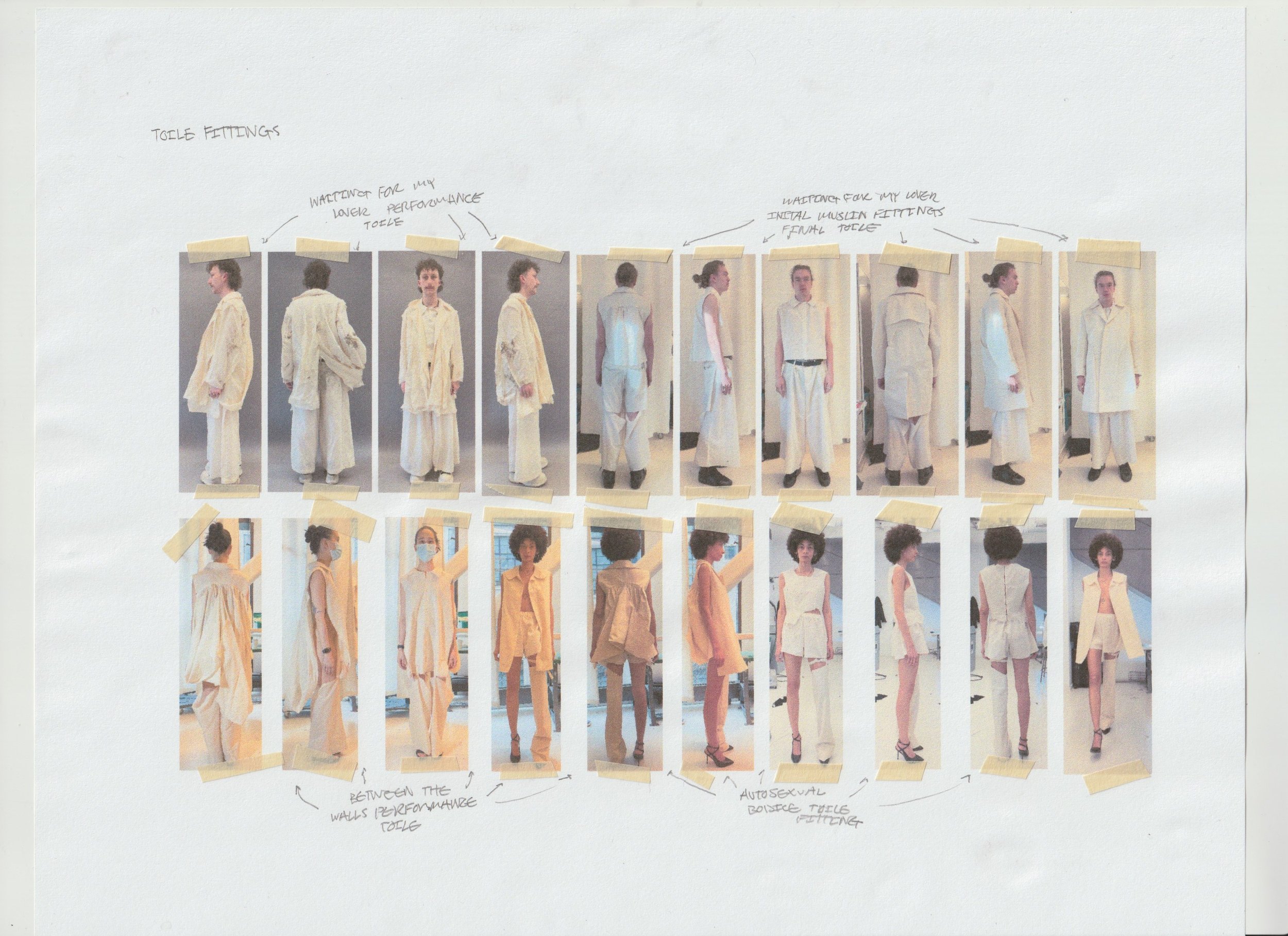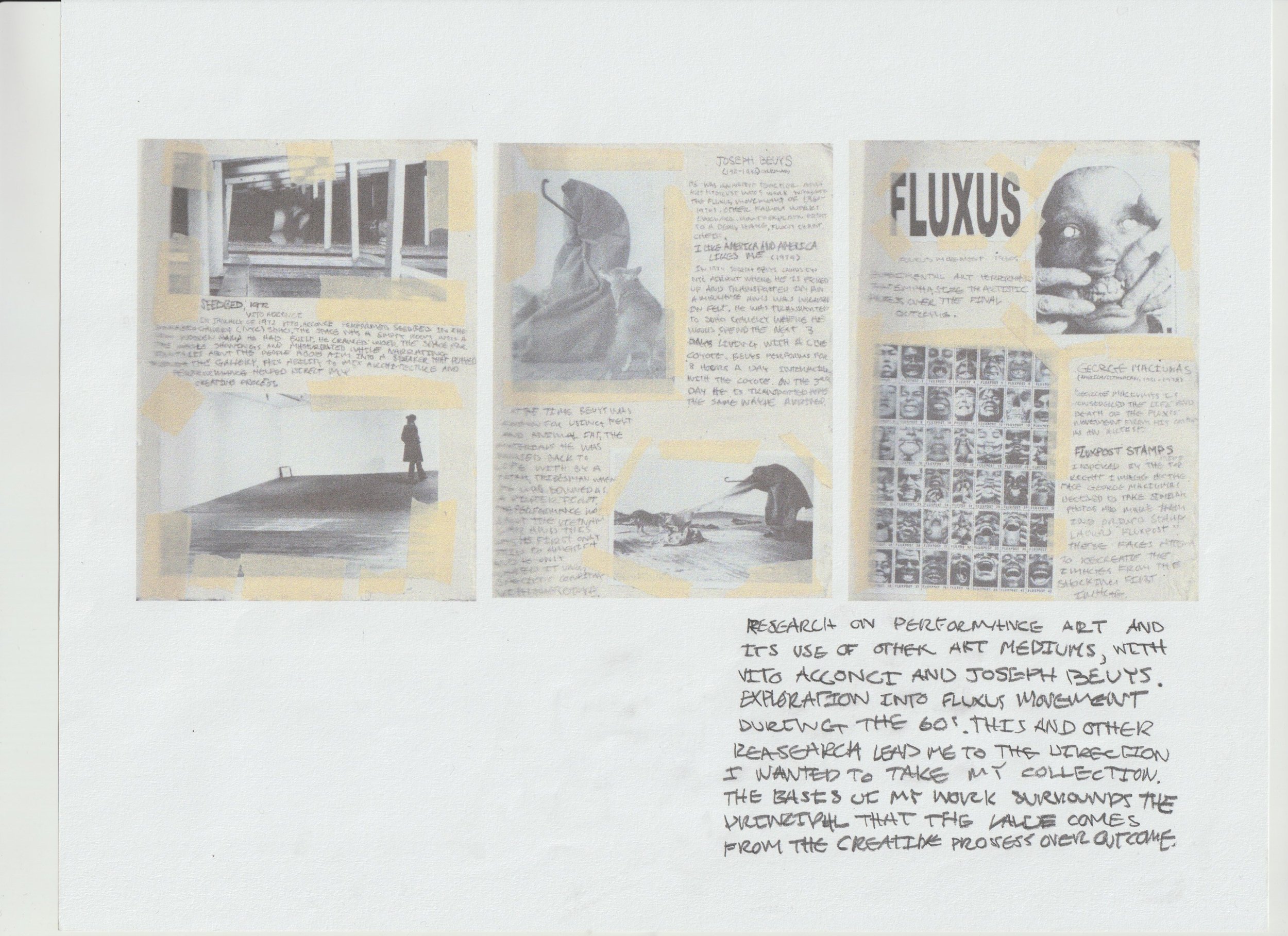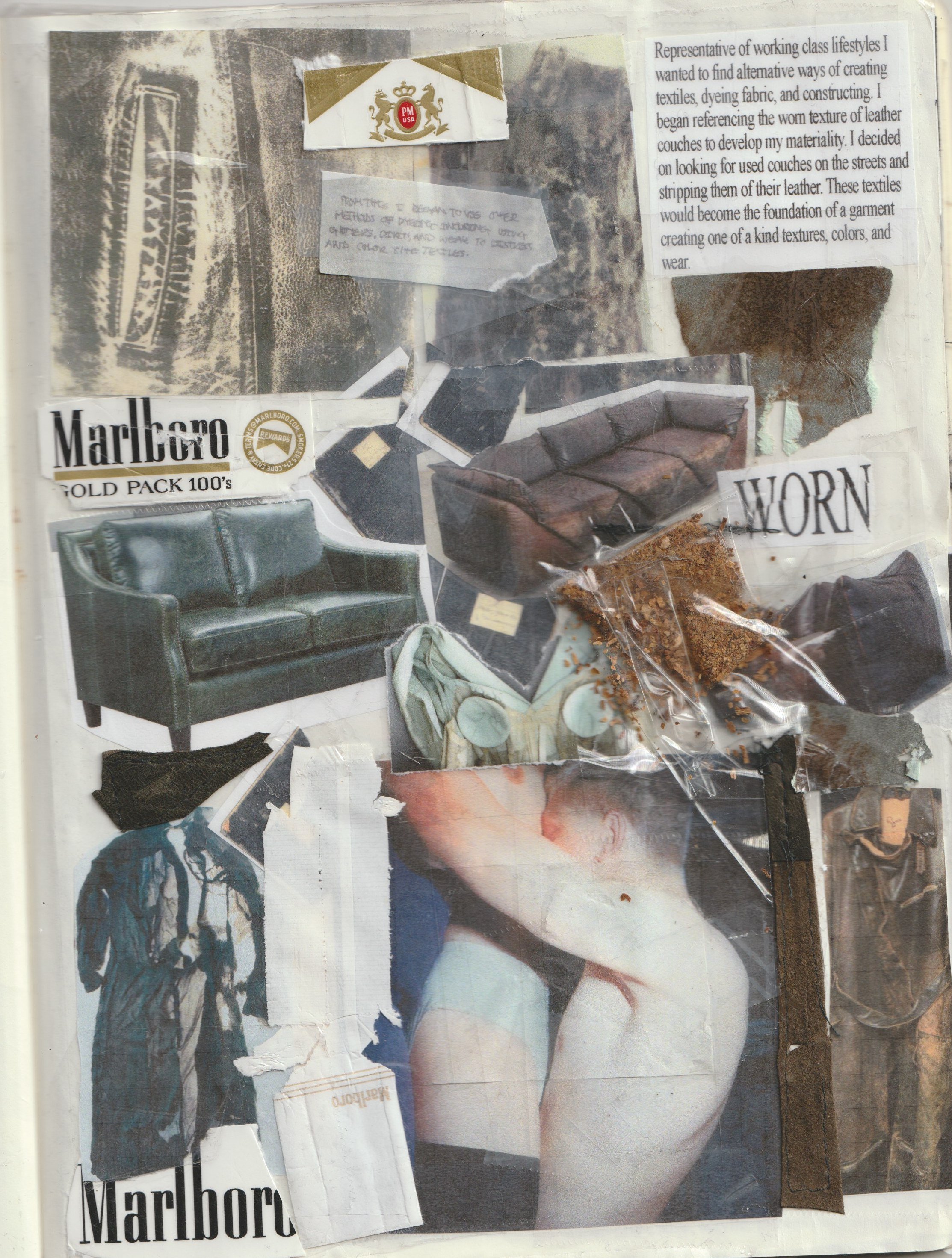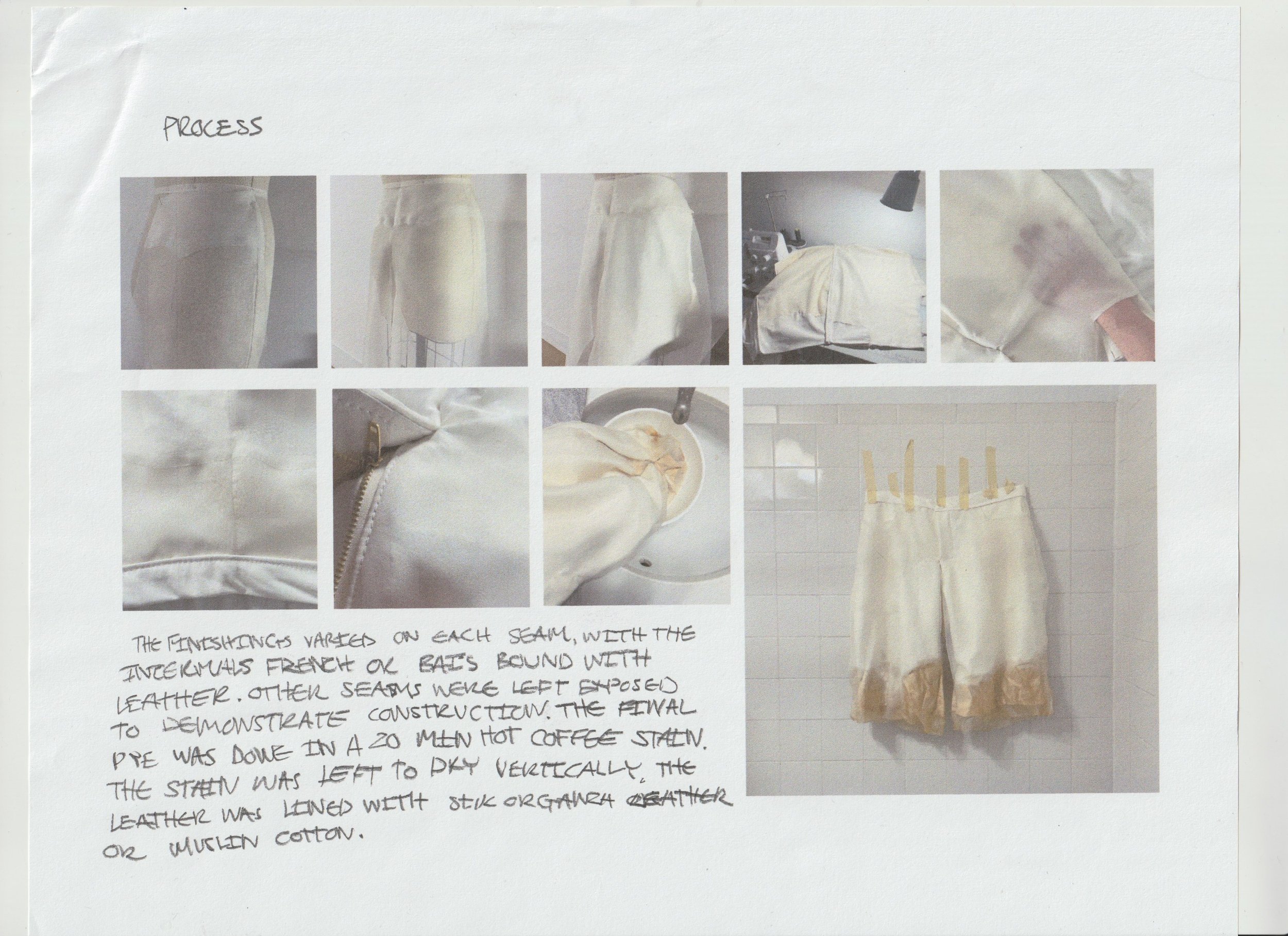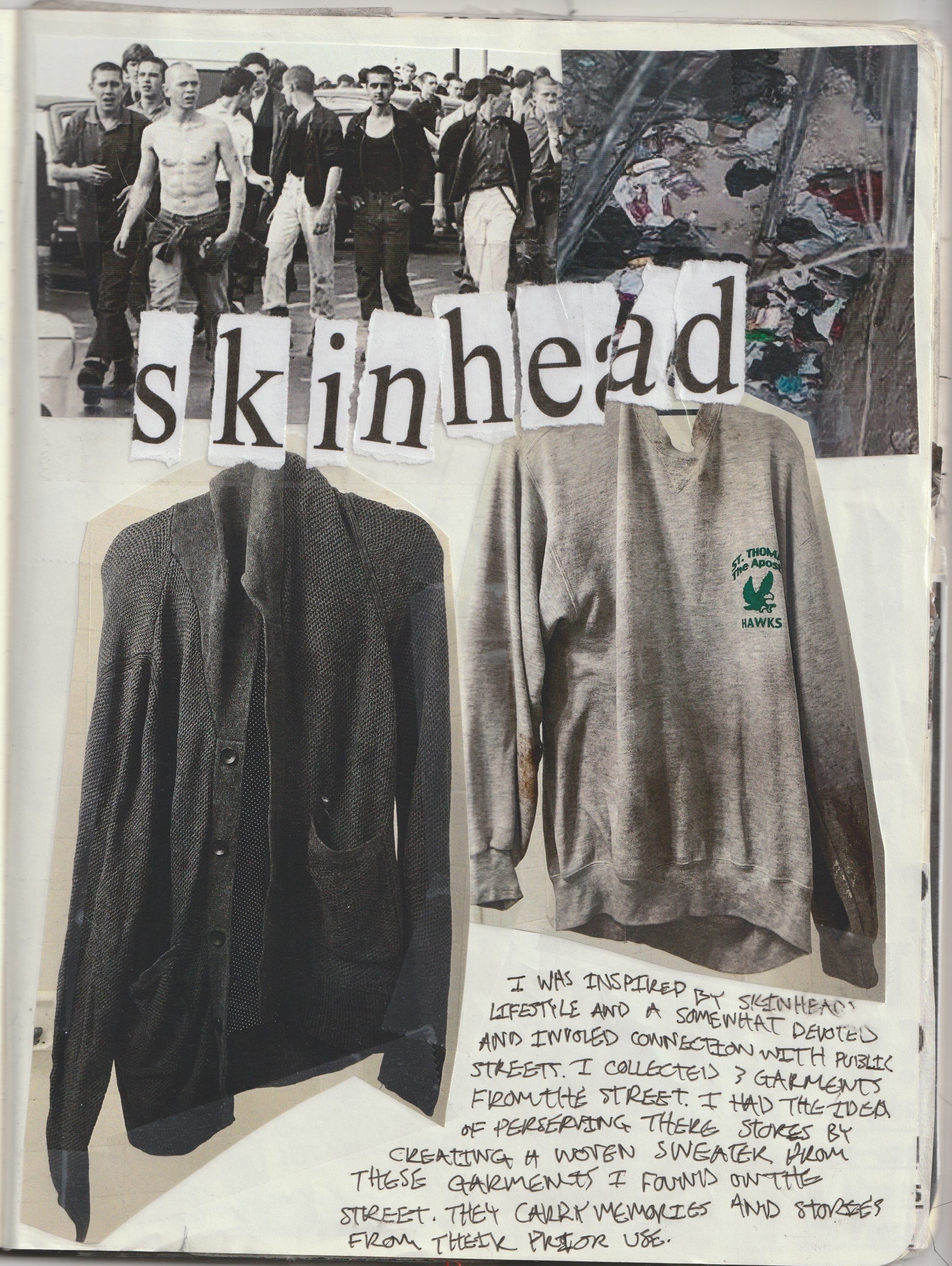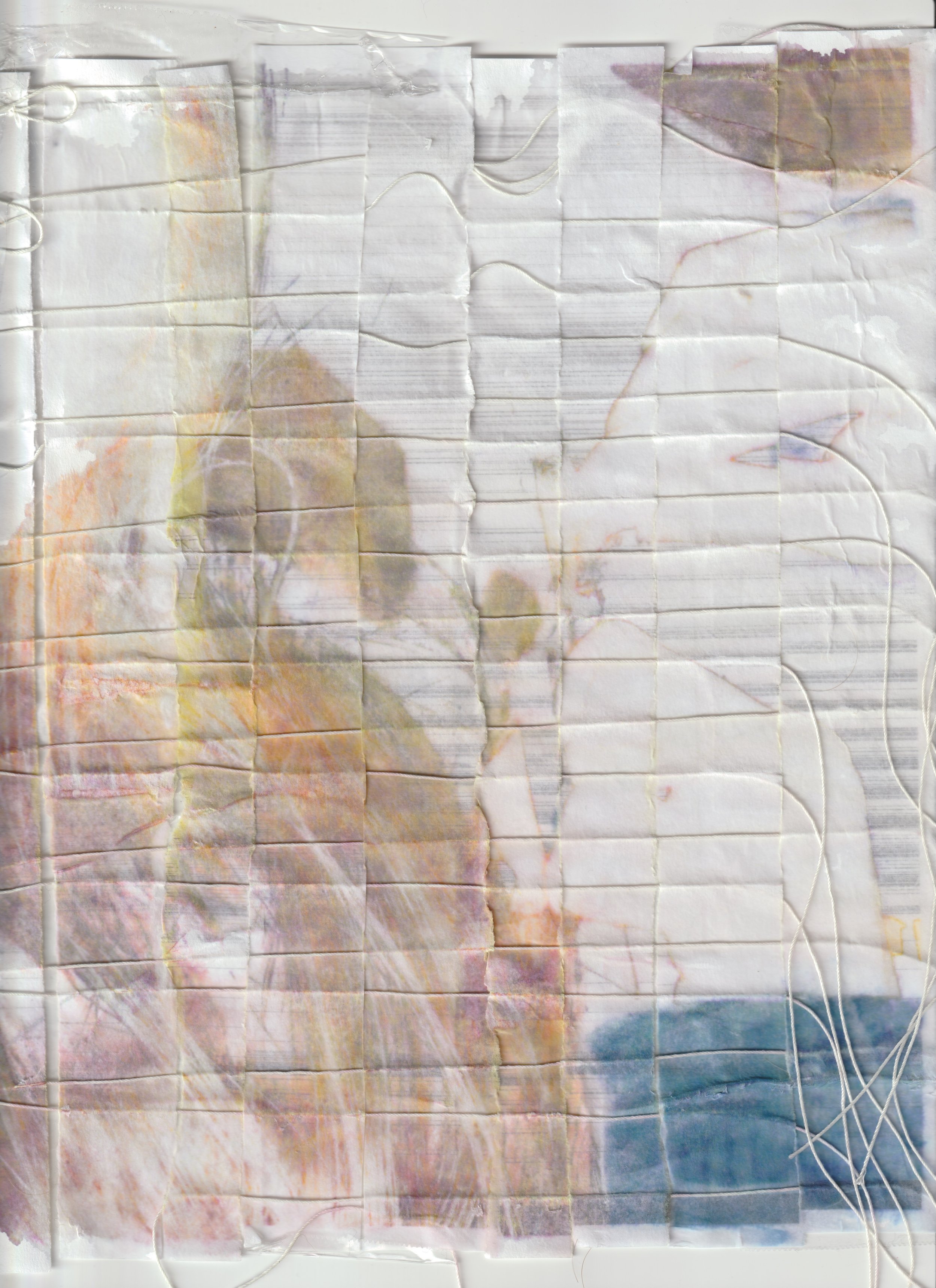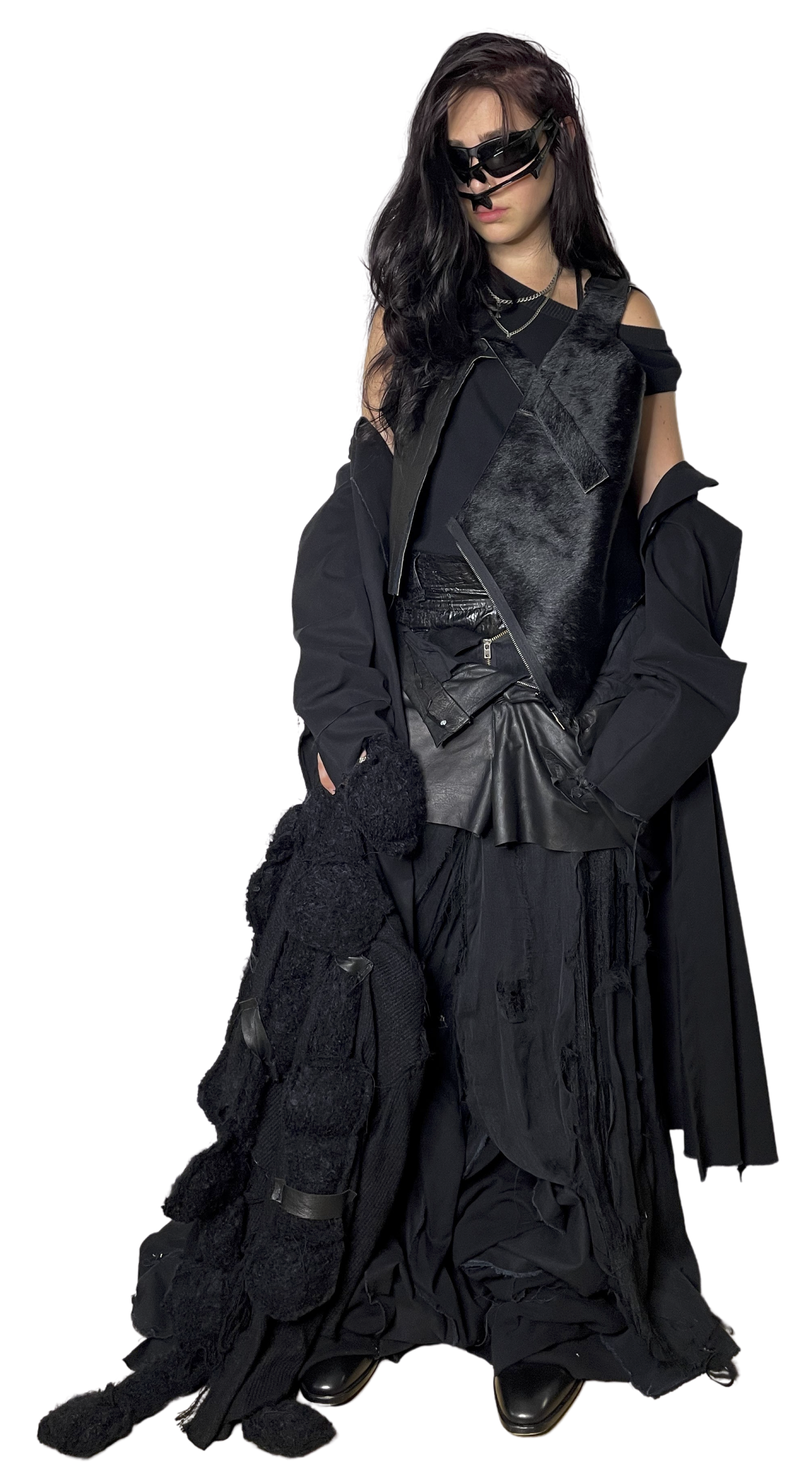collection archive
conor o’driscoll 2025 WEST - pinned silk tank-top: This piece sits within the broader language of West, where desire, pursuit, and the roughness of expansion sit against moments of delicacy. The pinned silk becomes a stand-in for the goods and materials sought after during the movement westward. The horse drawing ties the piece back to motion and territory, grounding the collection’s references without slipping into western styling. Small structural disruptions in the tank leave the garment feeling slightly undone, capturing that sense of restlessness and incompleteness that runs through the collection. Everything here sits in tension: softness held by makeshift hardware, desire held by fragility, progress held by the possibility of coming apart. (shot by: Marcko Torri - styled by: Elanur Erdogan)
conor o’driscoll 2025 WEST - tank & t-shirt drape: This tank & t-shirt drape is constructed from soft cotton jersey and ribbed jersey, merging two everyday garments into one sculptural form. Sewn together so that the tank twists and folds over the t-shirt, the piece creates a layered effect that transforms a basic silhouette into an experimental styling element. As part of the West collection, it continues the exploration of wrapping and subversion, challenging the straightforward utility of Western dress. The design draws inspiration from Wim Wenders’ 1984 film Paris, Texas, where themes of dislocation, estrangement, and fractured identity are mirrored in the garment’s twisting construction. Just as the film unsettles traditional narratives of the American West, this piece disrupts the conventions of casualwear, turning familiar garments into a layered commentary on memory, place, and transformation.
conor o’driscoll 2025 WEST - self wrap dress shirt: This wrap dress shirt, cut from white brushed cotton shirting, features an extended back yoke that creates the illusion of a shirt folding and wrapping over itself. As part of the West collection, it connects to a series of garments that explore wrapping, layering, and styling as transformative gestures. The design also references Joseph Beuys’ 1974 performance I Like America and America Likes Me, in which the artist swathed himself in felt and shared a confined space with a coyote to confront ideas of violence, healing, and myth within the American landscape. Echoing this act of wrapping as both protection and confrontation, the shirt reinterprets classic Western shirting while subverting its rigidity. By embedding this dialogue into the garment, the piece reflects a broader critique of the West as both a place of mythmaking and a structure to be unraveled.
This handsewn, handknitted dress brings together silk draping, mohair knit, and rose petals encased in pleated silk to create a garment suspended between fragility and edge. The mohair tank was knit by hand in ivory wool with varied needle sizes, resulting in an irregular, organic structure that shapes itself freely on the body. Behind it, a silk drape softens the silhouette, while pleated silk petals are stitched and tacked into place, adding dimension and movement. The process of free-knitting and hand-sewing emphasizes improvisation, imperfection, and material sensitivity, allowing the piece to evolve as it was made.
Part of the Lost Highway collection, the look draws on David Lynch’s 1997 film and its enigmatic blonde character, Alice Wakefield / Renee Madison (Patricia Arquette). Her portrayal of duality, allure, and disquiet inspired the garment’s play of exposure and concealment — sheer silk against textured knit, delicacy against rough edges. The petals suggest both beauty and decay, mirroring the film’s tension between desire and unease. In this way, the dress becomes an embodiment of “perfect imperfection,” a fragile yet confrontational piece that reimagines sex appeal and vulnerability through a distinctly avant-garde lens.
This full look from the Lost Highway collection merges intricate craftsmanship with cinematic reference, drawing inspiration from David Lynch’s 1997 film. The ascot shirt and soft corset reveal detailing that is often invisible at first glance: most of the garment is hand-sewn, from the intentional bunching on the sleeves to the bound neckline. Both pieces feature ties at the back that cinch and shape the body, while the front soft corset continues an ongoing dialogue in the designer’s work with corsetry, highlighted here through pad stitching and even masking tape as a design element. Sheer silk boxer shorts function as a styling layer, offset by a leather holster and glove, while an unreleased fringe bag and black boots complete the ensemble.
Across the look, printed and patched motifs of spilled oil run down the garments, increasing in scale as they descend the body. This imagery anchors the collection’s central metaphor, referencing oil as both stain and substance, disorder and transformation. Just as Lost Highway unsettles linear narrative with its spiraling, fractured storyline, the garments destabilize formality: the tailored upper layers suggest status and control, while the look gradually slips into darkness and misalignment through fabric, silhouette, and detail. Through this visual descent, the collection situates itself at the threshold between structure and collapse, a fashion parallel to Lynch’s disorienting vision of the American psyche.
conor o’driscoll 2024 - Lost Highway
conor o’driscoll 2024 Lost Highway - mink collar: This mink collar, from the Lost Highway collection, is rooted in the duality of Alice / Renee’s beauty — particularly the haunting scene where her blonde hair glows against the car. The closure takes the form of a key, evoking the constant presence of cars throughout the film and their role as symbols of power, escape, and fate. Crafted from mink repurposed from an old fur coat, the piece is lined with silk and finished with a layered internal print. Due to its delicacy, the entire garment is handsewn, a process that underscores its fragility and intimacy.
By embedding references to Lynch’s cinematic language, the collar reflects the film’s obsession with surfaces and illusions: glamour edged with unease, beauty caught in the headlights. The use of reclaimed fur complicates ideas of luxury, situating the garment within a narrative of reuse, distortion, and transformation — echoing Lost Highway’s blurred identities and shifting realities
conor o’driscoll 2024 - gaze collection
The collection is a modern take on the subculture of gay cruising in New York City. The collection's initial research comes from the 1970s, a peak for cruising in New York City. This research is then contrasted with a first-hand perspective of modern cruising. Focusing on the fleeting gaze that sparks connection, it aims to recreate intimacy and unite past and present through references to Mapplethorpe, Wojnarowicz, and Warhol. The collection aims to shock the audience and draw attention towards details in the construction and materiality, aspects of textile manipulation, and the use of intimate prints, shedding light on the collection's playful and direct nature. Utilizing cruising style sourcing of textiles and garments through websites and apps like Craigslist, these exchanges become interactions that make up the collection's research and demonstrate dedication toward the concept. Rooted in menswear, the collection extends to a genderless form through the use of both traditional menswear tailoring techniques and dressmaking.
defective workwear 2021 - conor o’driscoll
This collection was inspired by American workwear and its relation to the notion of the "American Dream". I decided to re-image workwear through the lens of rejection toward traditional function, construction, and comfort. The garments challenge notions of durability and construction through an often deconstructed take on American Workwear: The collection was accompanied by a gallery performance with three live models.
cult 2022 - conor o’driscoll
The cult collection was an exploration of the subject of cults and specifically the relationship between leaders and members. Inspired by imagery and the beliefs of Cult members, along with the use of religious motifs. The collection coincided with a three hour gallery performance with six live models.
skins (skinheads) 2022 - conor o’driscoll
The inspiration for this collection was Skinheads in England in the 1960s. I researched skinheads' lifestyles, the historic context, collective beliefs, and their beginnings. This led me to discover a unique process for construction, dying, and material sourcing. I decided to source fabrics and hardware from the streets, including leather couch upholstery, textiles from abandoned clothing, and dyeing textiles in the street. Additionally, Scanning and preservation are at the forefront of this collection, and they became a tool and symbolic of preserving the motives and beliefs of the original skinhead
sexual narrcisist 2023 - conor o’driscoll
For each look in my collection, I reference individual performances in a series of my own performances. These performances are taking part during the process of design and construction, but are separated as different works.
The process of construction starts with the performance toile. These muslin toiles will serve as the garments I will perform in. They are based on the contents or score of the performance, along with taking inspiration from the conceptual basis for the performance and the research that went into developing each performance. After the performance, the looks are reevaluated and redesigned based on the outcomes of the performance. A new set of toiles are developed in the process of reevaluation and they will serve as the basis for the final looks.
I decided to name the series "Sexual Narcissism" which is the central theme of the performances and collection.
Sexual Narcissism describes how the series of performances unfolds, a transition from the sexually dependent to the auto-sexual. I wanted to create a new reality or a narrative that describes the 'solution' or 'evolution' to sexual dependency and the downfall of love. I was inspired by animals that are able to reproduce asexually and more so the nuance of love in the animal/insect world. In reality, humans are generally monogamous and seemingly tend to settle down with one lover for a long period of time. It seems that among animals and insects, we are the only ones who behave this way or experience sexual emotional attachment to someone. In this series of performances, I attempt to dictate a narrative that simulates a transition from a human experience to an animal-like asexually dependent experience.
The first performance in the series is about dependency and waiting to be approached. I present myself as an object waiting to be freed by a lover from my own despair and filth. In the second performance, I become self-existing and closer to sexual interdependency. I begin to perform as an exhibitionist, seeking pleasure for those looking to voyeur, but I exist in a realm of self and cannot be interacted with. In the final performance, I seek full auto-sexual independence and perform in self-pleasure and in order to preserve self.
The performances together are all parts of this narrative. The first performance describes the sexually dependent archetype, dependent, submissive, selfless, and naive. In the performance, I put myself out into a public space to be consumed, to which I am rejected and ignored. In a jest of rejection, the second performance alludes to a new form of sexual consumption that centers around my sexual desires, yet doesn't allow me to exist as a consumable. I exist in the realm of exhibitionism, only existing behind a physical and metaphorical screen. As described in the final performance I finally exist in a realm of self, self-preservation, self-pleasure, and overall a sense of satiation and contentment with self. The final act is an act of self-pleasure demonstrating my newfound sexual independence to self.
The artistic process of construction and design is a performance that is of more value than the final outcome or garment. The garments that form the collections are a representation of individual performances surrounding a bigger concept and idea. The concepts I develop are often based on research into specific subcultures and their lifestyles, non-fashion-related artists' work, or explorations into using the self as a subject. The references I use tend to surround darker topics and themes that are somewhat overlooked and slightly controversial. My infatuation with fabric memory and preservation can be seen in the visual outcomes of my pieces demonstrated in the fabric sourcing and development of textiles.
untitled 2023 - conor o’driscoll
This collection was developed in-between two collections, which made it feel incomplete and never quite finished. This is what may have made these garments so spectacular and spontaneous. The singular concept the work was developed on was obsession. These garments have a focus on the specific obsessive use of one material, which developed into the safety pin coat and the following tops and dresses to come. Going forward, I knew that the concept of obsession would become a staple going forward for my work and behind my process of development. During the development of this collection, photographer Nico Daniels worked with the Alex Warren to develop a series of beautiful images on models Paloma Suarez and Mindy Miao. The series was named “An Allegory of the Constructed Image - A 21 Images Story featuring the garments of Conor O’Driscoll”.
gaze 2024 - conor o’driscoll
The collection is a modern take on the subculture of gay cruising in New York City. The collection's initial research comes from the 1970s, a peak for cruising in New York City. This research is then contrasted with a first-hand perspective of modern cruising. Focusing on the fleeting gaze that sparks connection, it aims to recreate intimacy and unite past and present through references to Mapplethorpe, Wojnarowicz, and Warhol. The collection aims to shock the audience and draw attention towards details in the construction and materiality, aspects of textile manipulation, and use of intimate prints shedding light on the collection's playful and directness. Utilizing cruising style sourcing of textiles and garments through websites and apps like Craigslist, these exchanges become interactions that make up the collection's research and demonstrate dedication toward the concept.
Rooted in menswear, the collection extends to a genderless form through the use of both traditional menswear tailoring techniques and dressmaking.
lost highway 2024 - conor o’driscoll
The Lost Highway collection reflects a cinematic unraveling of identity, intimacy, and distortion. Inspired by David Lynch’s 1997 film, the collection captures a sense of eerie transformation—between desire and decay, clarity and disorientation. The garments translate this psychological tension into form through distorted tailoring, hand-treated leathers, and silhouettes that shift between rigid and fluid states. Every piece carries a subtle duality: clean structures interrupted by raw edges, delicate fabrics juxtaposed against heavier materials. The result is a body of work that feels both cinematic and personal, echoing the blurred boundaries between self and projection, beauty and unease, that define Lost Highway.




